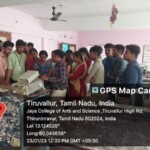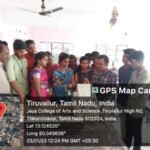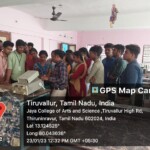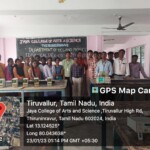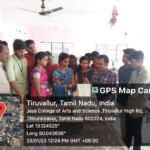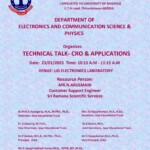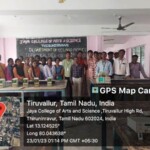DEPARTMENT OF ELECTRONICS & PHYSICS
History
The Department of Electronics was established in the year 1992 , the same year the college was founded. It started to offer UG program BES. From a humble beginning the department grew up to offer PG program MSc Applied Electronics since 2003. The Department of Physics was established in 1994 to offer Allied Physics Course and later evolved into a major Department to offer Undergraduates program BSc Physics since 2009. The PG Department of Physics was established in the year 2020 and offers MSc Physics program. The Electronics and Physics laboratories are well equipped for conducting the UG and PG programs. The PG students are well encouraged to do research using the Digital Signal Processing kit, Microcontroller kit, Microprocessors kit, Ultrasonic Interferometer, Hall effect apparatus and Guoy Balance that are available in our laboratoris.
Achievements
- BSc ECS producedUniversity First Rank 4 Times.
- BSc Physics produced University First Rank 1 Time.
- MSc Applied Electronics produced University First Rank 6 Times.
- Apart from these First ranks our students secured ranks within top ten several time.
UG RANK HOLDERS (ECS)
| Year | University First ranks |
|---|
| 2003-2006 | Ms. Niji |
| 2004-2007 | Ms. Reshma sultana |
| 2005-2008 | Ms. Uthra |
| 2006-2009 | Ms. Poornima |
PG RANK HOLDERS (AE)
| Year | University First ranks |
|---|
| 2012-2014 | Ms.Vishnu Priya |
| 2013-2015 | Ms. Pavithra |
| 2014-2016 | Mr. Arulkani |
| 2016-2018 | Ms. N.Mahalakshmi |
| 2017-2019 | Ms. R.Hemalatha |
| 2018-2020 | Ms. P.Priyadharshini |
UG RANK HOLDERS (PHYSICS)
| Year | University First ranks |
|---|
| 2011-2014 | Ms. Keerthik |
VISION & MISSON
| Vision | - Enrich the individuals to satisfy global demands with high competence.
|
| Mission | - To create a one-of-a kind learning environment for students to face the challenges in electronics era.
- To embed supportive network through holistic environment
- To encourage all encircling turn of events and reinforce the profound qualities.
- To build abilities to solve complicated technical problems of today.
- To accomplish more elevated levels of values and principles by embracing most advanced learning.
|
Programme Offered: B.Sc.Electronics and Communication Science
Program Objectives
| PO 1: | To familiarize students with the professional issues in Electronics and communication science including innovation, ethics, issues related to global economy and emerging technology. |
| PO 2: | Impact analytic and thinking skills to develop initiatives and innovative ideas for R&D, Industry and societal requirements. |
| PO 3: | Provide sound theoretical and practical knowledge of Electronics, managerial and entrepreneurial skills to enable students to contribute to the wellbeing of society with a global outlook. |
| PO 4: | Inculcate qualities of teamwork as well as social, interpersonal and leadership skills and an ability to adapt to evolving professional environments in the domains of engineering and technology. |
| PO 5: | Motivate graduates to become good human beings and responsible citizens for the overall welfare of the society. |
| PO 6: | Develop attitude in lifelong learning, applying and adapting new ideas and technologies as their field evolves. |
| PO 7: | Provide graduates with a strong foundation in Electronics domain and to enable them to devise and deliver efficient solutions to challenging problems in Electronics, Communications and allied disciplines. |
| PO 8: | To prepare graduates who will have knowledge, ability and courage to pursue higher studies and research. |
| PO 9: | Communicate effectively and manage resources skillfully as members and leaders of the profession. |
| PO 10: | Be receptive to new technologies and attain professional competence through lifelong learning such as advanced degrees, professional registration, publications and other professional activities. |
| PO 11: | To impart training to students to develop their professional skills for creating human resources of global standards for the Industry and Education. |
Program Specific Outcomes
| PSO 1: | Design/Development of solutions: Design solutions for complex Engineering problems and design system components or processes that meet the specified needs with appropriate consideration for the public health and safety, and the cultural, societal and environmental conditions. |
| PSO 2: | Engineering knowledge: Apply the knowledge of mathematics, Science, Engineering fundamentals, and an engineering specialization to the solution of complex engineering problems. |
| PSO 3: | Conduct investigation of complex problems: Use research based knowledge and research methods including design of experiments, analysis and interpretation of data, and synthesis of the information to provide valid conclusions. |
| PSO 4: | Problem analysis: Identify, formulate, review research literature and analyses complex engineering problems reaching substantiated conclusion using principles of mathematics and Engineering sciences. |
| PSO 5: | The engineer and society: Apply reasoning informed by the contextual knowledge to assess societal, health, safety, legal and cultural issues and the consequent responsibilities relevant to the professional engineering practice. |
| PSO 6: | Modern tool usage: Create, select, and apply appropriate techniques, resources, and modern engineering and IT tools including prediction and modeling to complex engineering activities with an understanding of the limitations. |
| PSO 7: | Environment and Sustainability: Understand the impact of the professional engineering solution in societal and environmental contexts, and demonstrate the knowledge of and need fire sustainable development. |
| PSO 8: | Life-Long learning: Recognize the need for and have the preparation and ability to engage in independent and life-long learning in the broadest context of technological change. |
| PSO 9: | Individual and team work: Function effectively as an individual, an as a member or leader in diverse teams, and in multidisciplinary settings. |
| PSO 10: | Ethics: Apply ethical principles and commit to professional ethics and responsibilities and norms of the engineering practice. |



